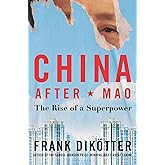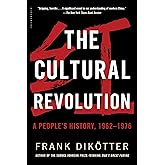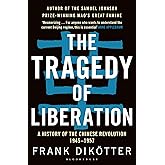Buy new:
$34.96$34.96
FREE delivery June 2 - 6
Ships from: Online Servant Sold by: Online Servant
Save with Used - Good
$14.75$14.75
Ships from: Amazon Sold by: Dream Books Co.

Download the free Kindle app and start reading Kindle books instantly on your smartphone, tablet, or computer - no Kindle device required.
Read instantly on your browser with Kindle for Web.
Using your mobile phone camera - scan the code below and download the Kindle app.



 Audible sample
Audible sample How to Be a Dictator: The Cult of Personality in the Twentieth Century Hardcover – December 3, 2019
Purchase options and add-ons
From the Samuel Johnson Prize-winning author of Mao's Great Famine, a sweeping and timely study of twentieth-century dictators and the development of the modern cult of personality.
No dictator can rule through fear and violence alone. Naked power can be grabbed and held temporarily, but it never suffices in the long term. In the twentieth century, as new technologies allowed leaders to place their image and voice directly into their citizens' homes, a new phenomenon appeared where dictators exploited the cult of personality to achieve the illusion of popular approval without ever having to resort to elections.
In How to Be a Dictator, Frank Dikötter examines the cults and propaganda surrounding twentieth-century dictators, from Hitler and Stalin to Mao Zedong and Kim Il Sung. These men were the founders of modern dictatorships, and they learned from each other and from history to build their regimes and maintain their public images. Their dictatorships, in turn, have influenced leaders in the twenty-first century, including Vladimir Putin, Xi Jinping, and Recep Tayyip Erdogan.
Using a breadth of archival research and his characteristic in-depth analysis, Dikötter offers a stunning portrait of dictatorship, a guide to the cult of personality, and a map for exposing the lies dictators tell to build and maintain their regimes.
- Print length304 pages
- LanguageEnglish
- PublisherBloomsbury Publishing
- Publication dateDecember 3, 2019
- Dimensions6.36 x 1.14 x 9.65 inches
- ISBN-101635573793
- ISBN-13978-1635573794
Book recommendations, author interviews, editors' picks, and more. Read it now.

Explore your book, then jump right back to where you left off with Page Flip.
View high quality images that let you zoom in to take a closer look.
Enjoy features only possible in digital – start reading right away, carry your library with you, adjust the font, create shareable notes and highlights, and more.
Discover additional details about the events, people, and places in your book, with Wikipedia integration.
Frequently bought together

Customers who viewed this item also viewed
From the Publisher



Editorial Reviews
Review
"How to Be a Dictator hits the perfect balance between popular and scholarly, and it’s difficult to imagine the reader who wouldn’t learn from it and enjoy the ride. Dikötter’s book is anti-communist and anti-authoritarian in its politics, but more importantly it is historically detailed and compelling in its chronicling of how dictators set about organizing an entire society around their own glorification and power. He makes his points in fresh ways and is careful to bring in fresh details. When he covers less famous dictatorships, like Mengistu’s Ethiopia, he brings the same sensibility, but he is never obscure." - Tablet Magazine
"How to Be a Dictator takes off from a conviction, no doubt born of [Dikötter’s] Mao studies, that a tragic amnesia about what ideologues in power are like has taken hold of too many minds amid the current ‘crisis of liberalism.’ And so he attempts a sort of anatomy of authoritarianism, large and small, from Mao to Papa Doc Duvalier. Each dictator’s life is offered with neat, mordant compression. Dikötter’s originality is that he counts crimes against civilization alongside crimes against humanity." - New Yorker
"Dikötter writes with academic rigor and awareness that these megalomaniacal figures continue to inspire fascination relevant to politically volatile times." - Kirkus Reviews
"Monuments crumble and statues fall, but How to Be a Dictator succeeds in identifying how and why linguistic domination has lasting power." - Paste
"If [The Cultural Revolution] were widely circulated in China, it could undermine the legitimacy of the current regime . . . This book is a significant event in our understanding of modern China." - New York Times Book Review on THE CULTURAL REVOLUTION
"A fine, sharp study of this tumultuous, elusive era . . . [An] excellent follow-up to his groundbreaking previous work . . . Dikötter tells a harrowing tale of unbelievable suffering. A potent combination of precise history and moving examples." - Starred review, Kirkus Reviews on THE CULTURAL REVOLUTION
"Richly documented . . . Dikötter paints a chilling picture." - Publishers Weekly on THE CULTURAL REVOLUTION
"For those who have swallowed the poisonous claim that the Communist Party deserves some credit for China's current patchy prosperity, Mr. Dikötter provides the antidote." - Wall Street Journal on THE CULTURAL REVOLUTION
"Dikötter's well-researched and readable new book on the Cultural Revolution's causes and consequences is a crucial reminder of the tragedies, miscalculations and human costs of Mao's last experiment." - The Guardian on THE CULTURAL REVOLUTION
"Fluent, compelling and based on a wide range of evidence." - Financial Times on THE CULTURAL REVOLUTION
About the Author
Frank Dikötter is Chair Professor of Humanities at the University of Hong Kong. Before moving to Asia in 2006, he was Professor of the Modern History of China at the School of Oriental and African Studies, University of London. He has published nine books about the history of China, including Mao's Great Famine, which won the BBC Samuel Johnson Prize for Non-fiction in 2011.
http://www.frankdikotter.com/
Product details
- Publisher : Bloomsbury Publishing
- Publication date : December 3, 2019
- Edition : First Edition
- Language : English
- Print length : 304 pages
- ISBN-10 : 1635573793
- ISBN-13 : 978-1635573794
- Item Weight : 1.34 pounds
- Dimensions : 6.36 x 1.14 x 9.65 inches
- Best Sellers Rank: #559,434 in Books (See Top 100 in Books)
- #52 in Propaganda & Political Psychology
- #70 in Fascism (Books)
- #650 in Popular Psychology Personality Study
- Customer Reviews:
About the author

Frank Dikotter is the author of a dozen books that have changed the way we look at the history of modern China, including Mao's Great Famine, winner of the BBC Samuel Johnson Prize for Non-Fiction in 2011. His work has been translated into twenty languages, including The Tragedy of Liberation: A History of the Chinese Revolution 1945-1957, which was short-listed for the Orwell Prize in 2014, and The Cultural Revolution: A People's History, 1962-1976, the final volume in his trilogy on the Mao era. He is Chair Professor at the University of Hong Kong and Senior Fellow at the Hoover Institution. More information can be found on his website at www.frankdikotter.com
Customer reviews
Customer Reviews, including Product Star Ratings help customers to learn more about the product and decide whether it is the right product for them.
To calculate the overall star rating and percentage breakdown by star, we don’t use a simple average. Instead, our system considers things like how recent a review is and if the reviewer bought the item on Amazon. It also analyzed reviews to verify trustworthiness.
Learn more how customers reviews work on AmazonCustomers say
Customers find the book to be an excellent read with great information, particularly noting the fascinating introduction. However, the analysis quality receives negative feedback, with one customer describing it as merely an accounting of sequential facts.
AI-generated from the text of customer reviews
Select to learn more
Customers find the book to be an excellent read, with one customer noting that every chapter was fascinating.
"Excellent read it shows how many different dictatorships begin, progress and ultimately collapse...." Read more
"...Heck, I am going to do that anyway. Worth the read if you are interested in the topic and it will become a starting point for you for some of the..." Read more
"I can't say enough good things about this book. It's informative, well-written and fast paced. I learned so much from it." Read more
"This relatively short read offers a good summary of the story of some key, primarily communist, dictators...." Read more
Customers find the information in the book to be great, with the introduction being particularly fascinating.
"...The introduction was fantastic. The pieces in the book could have been put together better...." Read more
"I can't say enough good things about this book. It's informative, well-written and fast paced. I learned so much from it." Read more
"...The prefaced promised and I expected the cult of personality of authoritarian leadership to be a running thread through the rest of the book...." Read more
"...It's an excellent way to learn about well known and not so well known tyrants, the methods they used and the devastation they caused...." Read more
Customers find the book's analysis lacking, with one review noting it reads merely as an accounting of sequential facts rather than providing meaningful insights.
"...Simply put, the execution wasn't the best...." Read more
"...The summary at the end was also disappointing, a missed opportunity to tie everything together. In the end, I think the title is misleading...." Read more
"...However, while the book shows clear patterns between them, it lacks in analysis, and, well, overall leaves to the reader to figure out "how to be a..." Read more
"...the dictatorial leaders or their followers and reads merely as an accounting of sequential facts, failing entirely in analysis...." Read more
Reviews with images
An utterly disappointing book
Top reviews from the United States
There was a problem filtering reviews. Please reload the page.
- Reviewed in the United States on May 25, 2024Excellent read it shows how many different dictatorships begin, progress and ultimately collapse. A must read for anyone who wants to be aware of how easy dictatorships take utter control and the extreme measures they take to maintain power and control
- Reviewed in the United States on January 2, 2020Having read Dikotter's trilogy about Mao (Tragedy of Liberation, Mao's Great Famine, and The Cultural Revolution) I had somewhat high expectations for this book. That being said, this book was not 100% what I had expected. Every chapter was fascinating and I learned about some lesser known dictators, the one that stuck out to me the most was Ceausescu. The introduction was fantastic. The pieces in the book could have been put together better. There wasn't much flow to it, it was just short 25-35 page biographies highlighting different tactics used by different dictators. There wasn't any comparison or contrast, or determining which leaders were most effective or least effective, etc. However, the information in the book was great. Simply put, the execution wasn't the best. However, if I had known beforehand that it was just going to be short biographical sections I probably would have just bought their biographies. Heck, I am going to do that anyway. Worth the read if you are interested in the topic and it will become a starting point for you for some of the leaders.
- Reviewed in the United States on January 14, 2020I can't say enough good things about this book. It's informative, well-written and fast paced. I learned so much from it.
- Reviewed in the United States on November 21, 2023An interesting book to understand political personalities in an introductory way.
- Reviewed in the United States on December 6, 2019I thought the introduction of this book was fascinating, discussing the cult of personality used by many authoritarians. The prefaced promised and I expected the cult of personality of authoritarian leadership to be a running thread through the rest of the book. But, at least in my read, it was not. Instead, each chapter is the history of a different dictator, treated almost entirely independently, with what I thought was far too little comparative discussion of their tactics and only some of the promised discussion of how they generated and maintained their cult of personality. The summary at the end was also disappointing, a missed opportunity to tie everything together. In the end, I think the title is misleading. This is less how-to-be-a-dictator and more independent summaries of several 20th century dictators. I learned a bit from the read, but was disappointed it was not as I expected.
- Reviewed in the United States on August 18, 2023A warning to people.
- Reviewed in the United States on December 26, 2022This relatively short read offers a good summary of the story of some key, primarily communist, dictators. It's an excellent way to learn about well known and not so well known tyrants, the methods they used and the devastation they caused. However, while the book shows clear patterns between them, it lacks in analysis, and, well, overall leaves to the reader to figure out "how to be a dictator". A worthwhile read nonetheless.
- Reviewed in the United States on November 1, 2020Good book
Top reviews from other countries
 Teresa WantingtonReviewed in Canada on November 26, 2019
Teresa WantingtonReviewed in Canada on November 26, 20195.0 out of 5 stars How life can change very quickly.
Well written and informative, learned a good deal from it, and can appreciate. how quickly countries and lives can change for the worse.
One person found this helpfulReport Hector macLeodReviewed in the United Kingdom on September 23, 2019
Hector macLeodReviewed in the United Kingdom on September 23, 20195.0 out of 5 stars Thin Skinned Narcissists
This is a very unpleasant but necessary read. We see an array of hugely narcissistic monsters. Narcissism and psychopathy are perhaps two sides of the same coin. Despots and autocrats are still with us and several are very much live and dangerous to world peace. One aspect that the book does not touch upon, perhaps it is beyond its purlieu, is the colossal and long lasting psychological damage done to their victims. After the Cultural Revolution in China, there were millions whose lives had been wrecked and to this day there are large swathes of Chinese peoples who suffer psychological damage. It is hard to conceive that a large portion of a billion people have post traumatic stress disorder and borderline personality issues. Far from promoting the sharing ethos of communism, Mao’s heritors are among the most arrogant, acquisitive, venial and corrupt people on the planet.
It is very hard to find a clear psychologically-evidenced portrait of either Stalin or Mao, though Hitler’s psychology is well documented. Just what impelled them to become mass murderers is surely worthy of study. Large scale human slaughter is the badge of the dictator which seems to be forgotten and certainly forgiven if they are wealthy or their countries strategically important. These homicidal regimes were awash with the blood of those who dared to upset the self regard of the narcissist. We forget this at our peril.
As Sam Rayburn put it “any jackass can kick a barn down, but it takes a good carpenter to build one”.
One person found this helpfulReport K P VineethReviewed in India on December 27, 2023
K P VineethReviewed in India on December 27, 20235.0 out of 5 stars Great insights about dictators
Good to know more about dictators, one can find a lot of common points within all the dictators mentioned like starving people, climbing too high for personal glory, instil fear by raising a personal army, confiscating public property etc. One can observe the same path followed by the dictators i.e., rising too high and collapsing to the ground.
 Arthur WensleydaleReviewed in Australia on February 14, 2020
Arthur WensleydaleReviewed in Australia on February 14, 20204.0 out of 5 stars A collection of little biographies without any unifying theory.
The good news is that the stories are interesting. I didn’t know, for example, that Mussolini was the first of the 20th century dictators and that others sound a lot like copies of him. There are also minor characters (Duvalier and Mengistu) of whom I knew little or nothing.
The flaws of the book, in my opinion, are two:
Firstly, it’s not a “how to” book at all - it’s just a bunch of stories. There is a whole body of theory on the establishment and running of dictatorships; the author makes no attempt to go into any of this or even recognize it.
Secondly, in the “Afterword” section, the author writes rather mockingly about the Timothy Snyders who warn of emerging cracks appearing in the rule of law in western democracies. I found this section to be hopelessly naive and unworthy of a serious scholar (especially one whose three volumes on modern China are so good)
 Rajiv ChopraReviewed in India on March 22, 2021
Rajiv ChopraReviewed in India on March 22, 20214.0 out of 5 stars Enlightening!
I don't think that this is a book on how to be a dictator. What Frank Dikotter has done, is to profile 8 dictators, and he has done an excellent job in this.
What you gain from this, if you highlight/underline key sections, and make notes, is a kind of dictator's play book.
You do get an understanding of how the various dictators have positioned themselves.
What you don't get, and this is a pity, is an analysis of the conditions that allow dictators to grow.
All in all, an enlightening book.



















